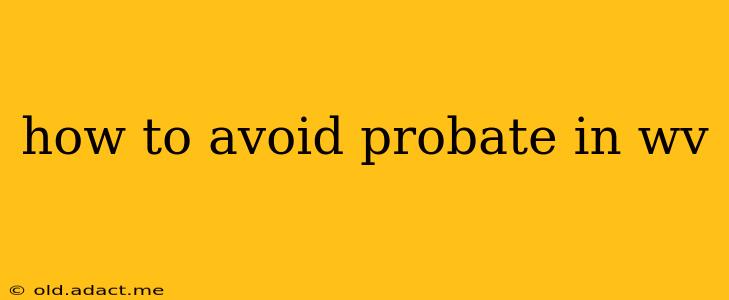Probate, the court-supervised process of administering a deceased person's estate, can be time-consuming, expensive, and emotionally draining. Many West Virginians seek ways to avoid probate altogether, and fortunately, several legal strategies exist to achieve this. This guide explores effective methods for bypassing probate in WV, addressing common concerns and offering valuable insights.
What is Probate in West Virginia?
Before delving into avoidance strategies, understanding probate itself is crucial. In West Virginia, probate involves the legal process of validating a will, paying off debts, and distributing assets to heirs. This process can take months, even years, depending on the complexity of the estate. Court fees, attorney fees, and other administrative costs can significantly reduce the inheritance beneficiaries receive.
Common Ways to Avoid Probate in WV
Several effective strategies can help West Virginia residents avoid the complexities and costs of probate. These include:
1. Establishing a Living Trust
A living trust, also known as a revocable trust, is arguably the most effective method to avoid probate in West Virginia. This legal document transfers ownership of assets to a trustee, who manages them according to your instructions. Upon your death, the assets are transferred directly to your beneficiaries, bypassing the probate court. You retain control of the assets during your lifetime and can modify or revoke the trust at any time.
2. Utilizing Joint Ownership
Holding assets jointly with another person, such as a spouse or child, with right of survivorship, means ownership automatically transfers to the surviving owner upon death, avoiding probate. This applies to bank accounts, real estate, and other assets. However, it's crucial to understand the implications of joint ownership regarding estate taxes and creditor claims.
3. Transferring Assets on Death (TOD) or Payable on Death (POD)
Designating beneficiaries on accounts like bank accounts (POD) or brokerage accounts (TOD) ensures the funds transfer directly to the named beneficiaries upon death without going through probate. This is a simple and straightforward method for smaller accounts and investments.
4. Utilizing Pay-on-Death (POD) or Transfer-on-Death (TOD) Deeds
Similar to POD and TOD accounts, you can use a POD or TOD deed for real estate. This designates a beneficiary who receives ownership of the property upon your death, avoiding the probate process.
Frequently Asked Questions (PAA)
Here are answers to some common questions about avoiding probate in West Virginia:
What are the advantages of avoiding probate?
Avoiding probate offers several key advantages:
- Reduced costs: Probate fees and attorney fees can significantly reduce the inheritance.
- Increased privacy: Probate proceedings are public record, whereas trusts maintain privacy.
- Faster distribution of assets: Assets are distributed to beneficiaries much quicker than through probate.
- Simplified administration: The process is streamlined, reducing stress for heirs.
Are there any disadvantages to avoiding probate?
While generally advantageous, there are potential downsides to consider:
- Complexity of setting up trusts: Establishing a trust involves legal fees and requires careful planning.
- Potential for challenges: A poorly drafted trust can still lead to legal challenges.
- Loss of control: While a revocable trust allows control during life, an irrevocable trust relinquishes control.
What is the best way to avoid probate in West Virginia?
The "best" method depends on individual circumstances, including the size and complexity of the estate, family dynamics, and financial goals. Consulting with an estate planning attorney is crucial to determine the most appropriate strategy.
What if I don't have a will?
Dying intestate (without a will) means the state of West Virginia will dictate how your assets are distributed according to its intestacy laws. This often leads to probate, and the distribution may not align with your wishes.
How much does it cost to set up a trust?
The cost varies depending on the complexity of the trust and the attorney's fees. It's advisable to obtain quotes from several estate planning attorneys in West Virginia.
Conclusion
Avoiding probate in West Virginia offers significant benefits, including cost savings, privacy, and faster asset distribution. While several methods are available, the best strategy requires careful consideration and expert guidance. Consulting with a qualified West Virginia estate planning attorney is crucial to develop a personalized plan that addresses your specific needs and goals, ensuring a smooth and efficient transfer of assets to your loved ones. Remember, proactive estate planning safeguards your legacy and protects your family's future.
